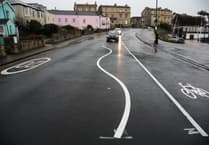The government has indicated it could allow the West of England Metro Mayor to step in and save threatened bus routes using ringfenced funding but — a week after the announcement and with the scrapping of three key Somerset buses fast approaching, including Paulton and Midsomer Norton's 82 bus — the Metro Mayor says he still has not spoken to the government.
The Metro Mayor, who had previously been told he could not use his ringfenced “bus service improvement plan” (BSIP) funding to pay for supported bus services, said he welcomed the flexibility but could not use the money to keep “propping up a system” of supported buses.
Supported bus services are those which are not commercially viable for bus companies to run so are funded by local councils. But across the West of England, councils have withdrawn their funding for these lifeline bus routes.
In North East Somerset, three “supported” bus services are set to be cut next week as Bath and North East Somerset Council withdraws its funding for them.
The 82 between Paulton and Radstock will be withdrawn effective June 3rd, and the 179 and 768 which both run between Midsomer Norton and Bath and will be withdrawn effective June 4th. 15 other supported buses in the council area have already been cut.
Metro Mayor Dan Norris has been urged to step in and support the routes using the £57m BSIP grant he received from the government. But Mr Norris has maintained that this funding is only for “new and innovative” bus schemes and he had been told by the government it cannot be used to fund supported buses.
Now a government minister has said he is prepared to allow the Metro Mayor funding to be used for supporting buses.
Asked in the House of Commons on Wednesday, 17th May by Bristol East MP Kerry McCarthy if Mr Norris would now be able to spend government funding on supported buses, Roads Minister Richard Holden said: “I am prepared to ensure maximum flexibility in order to preserve bus routes and enhance bus routes wherever we possibly can.”
The Department for Transport confirmed to the Local Democracy Reporting Service that it is willing to be flexible with how BSIP funding is used and that local government could decide if supporting bus services would provide best use for money and become sustainable long-term.
Mr Holden told the House: “If the Mayor would like to speak to me further — I tried to call him today; he sent me a message to say we will have to speak later — I would be very happy to speak to him about that and to have my civil servants work with him.”
But almost a week later, Mr Norris confirmed that they still had not spoken. Speaking on Tuesday, 23rd May, he said: “Richard [Holden} will have sent me a proper formal note, I am sure, as a minister and obviously when I see that I will respond in the appropriate way as always — very keen to speak to him as this may have possibilities.”
He said that he had been “lobbying them hard” for more flexibility with how the BSIP grant could be used, but he made no commitment to use the funding to support the bus services.
He said: “If this is an easing up of how it can be used, I welcome that. Now obviously the devil will be in the detail and I’ll need to see exactly what it is that they are suggesting.”
Mr Norris added that he did not think this would come into effect until July — meaning that it could not be used to save the buses being axed in June — and that much of the money had been allocated to schemes and officers would need to check “if there’s any money left over.”
He said: “I would be happy to say to local councils, where they have got subsidised buses that they think are very important, to meet me halfway and we will see if we can go 50/50 to keep some of these routes going. But what I can’t just do is give loads of money, that’s going to be ideally getting behaviour change, over to just propping up a system that will stop when that money stops.”
Mr Norris made the comments while at the launch of a new initiative — funded by the BSIP grant — to give people in the West of England free bus travel in the month of their birthday.
Residents in the West of England will be able to sign up online for the scheme, which starts from July and will initially run for a year.
He said: “There have been other initiatives but not like this one. And the idea is that we can build in behaviour change. […] This is designed to get all those people, either bus users already or even more importantly people who haven’t used the bus, to try it, see it, try it for a whole month and see how good it can be.
“Because in London people no more think of flying than driving a car and that is what I would like to see in our area.”
The scheme will cost an estimated £8m. Mr Norris said: “That is a big sum of money, but it is something innovative and new and that is something we have got to do. Because if we carry on in the same old way we know what the outcome will be.”
LDRS, John Wimperis




